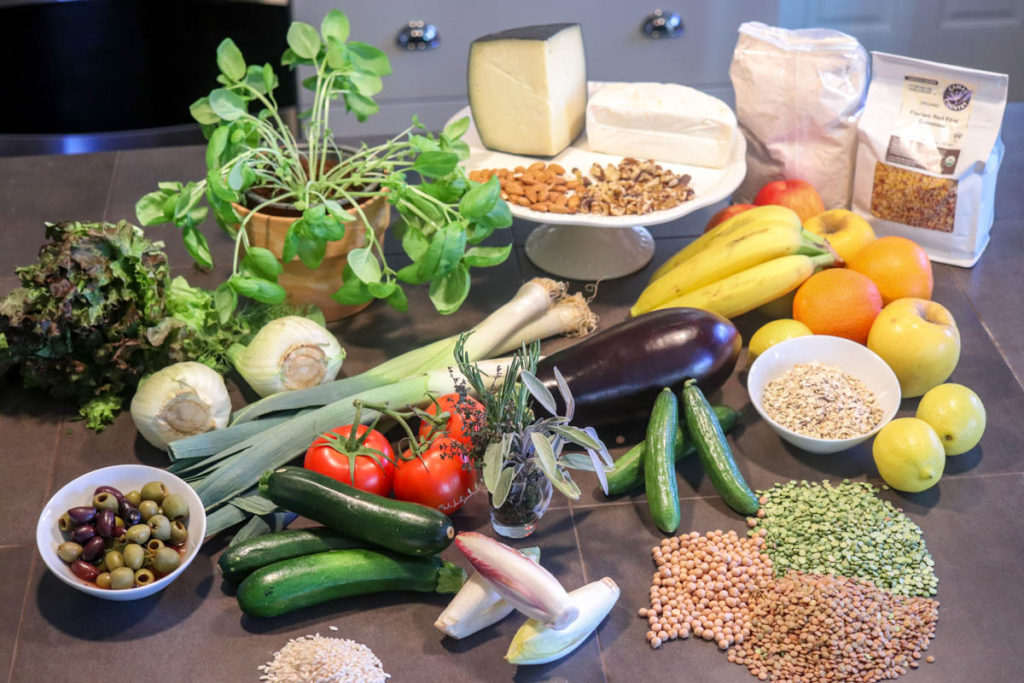The other day, while waiting in line at the cash register after shopping for groceries, I double-checked my list and my cart for the usual two reasons: to verify that I had bought everything and to make sure that there was enough variety.
I love variety, not only because I know that it’s a good dietary habit but also because it affords me the luxury of being creative with my menus and to satisfy my eating whims.
I’ve been this way since I can remember. Even if my mother sent me to the grocery store with a shopping list, I regularly came home with two or three extra items “just in case”, like I used to tell her to justify my digressions from her precise instructions. My purchases didn’t reflect the typical desires of a girl of my age (ice cream, candies, chips, etc.) but were instead simple alternatives to what my mother was normally cooking. She was a great cook but she had a tendency to repetitiveness. She never admitted her creativity limitations, she never bought cookbooks for inspiration, and therefore her cooking ended up being monotonous. She cooked too much meat for my taste but, each and every time I dared to complain, she threatened, “If you don’t like the way we eat in this house, you can ask my friend Lina to adopt you!” She knew all too well that such a prospect would quickly put an end to my grumbling, and it regularly worked.
My mother’s friend Lina married very young, knowing very little about cooking. Apparently, one of the first things she understood about her culinary duties was that she didn’t like all the learning, shopping and planning it involved.
So she found, and implemented, a very simple solution: she decided that she would learn to cook fourteen different dishes and that she would cook the same two (one for lunch and one for dinner) on the same day of the week.
I remember her husband joking that he didn’t need a calendar to know the day of the week. All he had to do was to look in his plate because, for the fifty plus years they were married, Lina kept serving exactly the same two dishes on the same day of the week.
And she didn’t even put the effort to make them special in any way. One would expect that, with all that practice, she would produce wonderful pastas, or rich pot roasts, or creamy risottos and hearty soups. Instead, everything she made had a bland taste, still acceptable, but in an anonymous, dull way.
Even physically Lina wasn’t the archetype of the Italian cook: tall, stern, and bony, she reflected the frugality of her table, or vice versa. My mother knew very well how much I hated Lina’s hospital-style, flavorless cuisine, as I knew she did as well because she always found a pretext – while pinching my arm so I wouldn’t dare to expose her fib – to decline her friend’s rare invitations to dinner.
It’s well known that the little and big traumas of our childhood end up guiding our choices as adults, so I guess that Lina’s culinary monotony is one of the reasons why I love diversity so much.
Combine that with my habit to plan my menus according to the weather – I hate the idea of a salad on a cold day as much as I find a hot soup unpleasant in the summer – and you’ll find me checking the weekly weather forecast before doing my grocery shopping.
Not a bad idea, you must admit.
I can still improvise, but it’s reassuring to have all the ingredients I need so that most of the menus are already basted in my mind at the beginning of the week and I can devote more attention to the fine stitching, i.e. the little surprises that can make any meal special, innovative, and more enjoyable.
So I encourage you to buy a special bread, a couple extra different vegetables, those tiny greens that go on everything, or a cheese you’ve never tried before.
Go to the produce section of your supermarket or your Farmers’ Market, close your eyes for a second and imagine the tastes of what is in front of you. Decide what your heart desires and, with generosity and imagination, try to envision it on your table. Be daring with new tastes, experiment different combinations, and be creative.
It’s not going to make a big difference on your budget but it’s certainly going to have a big impact on you mood, your health and the way you think of food.
We are lucky that so many choices are available to us; let’s take advantage of them!

